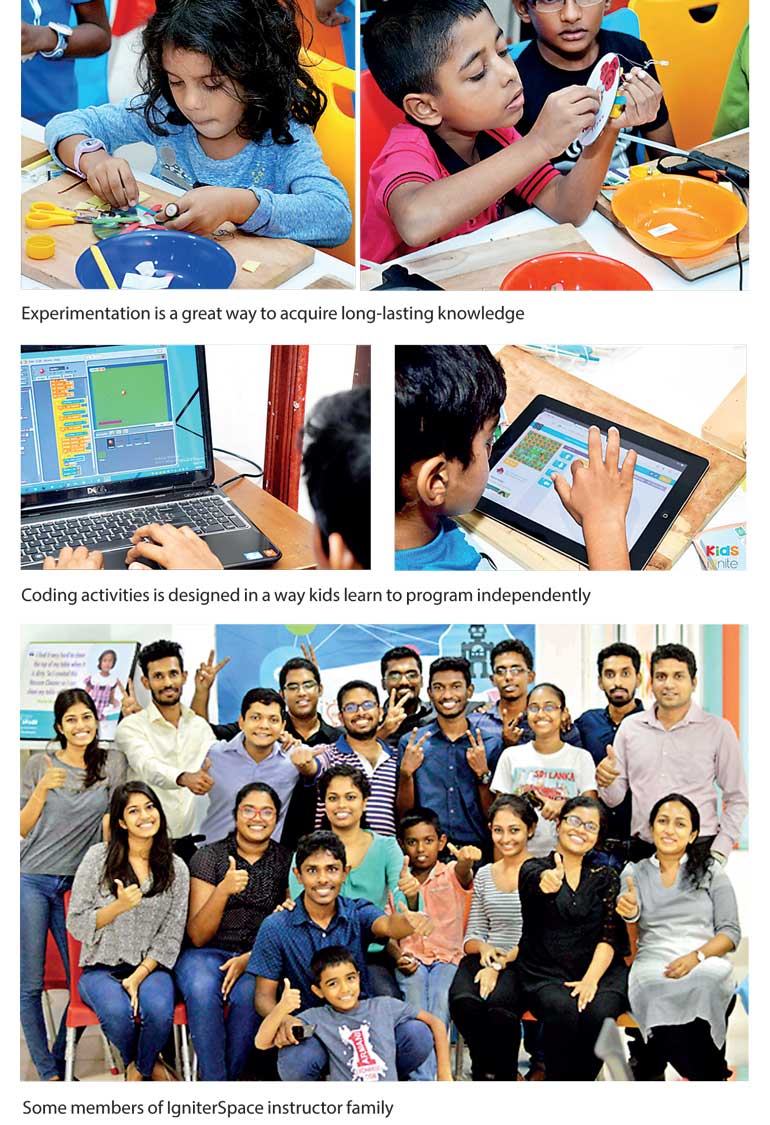Tuesday Feb 17, 2026
Tuesday Feb 17, 2026
Friday, 8 September 2017 00:00 - - {{hitsCtrl.values.hits}}

In a world where knowledge has become an increasingly ubiquitous commodity thanks to the internet, learnability is slowly but surely replacing it in the classroom as the single most important trait that younger students need to be inculcated in. So says IgniterSpace Founder Hasith Yaggahavita, who believes that training children in critical thinking ought to take precedence over spoonfeeding them information.
An engineer by profession, Yaggahavita founded IgniterSpace in March 2016 with the objective of filling a much needed gap in technology-driven creativity education for children. The father-of-two is a strong advocate of an education methodology that gives priority to developing creative abilities over drilling in knowledge. This is a core belief that’s reflected in the refreshingly practical approach to technology education employed at his first-of-its-kind makerspace. In just over a year, IgniterSpace has grown into a fully-fledged institute supported by state-run tech giants such as COSTI, SLASSCOM and ICTA, and employs over 15 full-time and 30 part-time instructors.
Yaggahavita is highly critical of the prevailing culture of force-feeding knowledge and evaluating students on their ability to regurgitate that knowledge.
“The current education philosophy was designed hundreds of years ago for the purpose of retaining knowledge. At schools, we feed children information. We expect them to remember that information, and test for accuracy at exams. In many ways, we expect children to become walking encyclopedias. It might have worked in the past but there is an issue with this model today,” he says.
Yaggahavita believes that knowledge is a perishable commodity, in that what one learns today may be invalidated by a new discovery made tomorrow.
“This is specifically true in the rapidly advancing tech-era. Simply having knowledge does not guarantee the usefulness of it,” he opines.
The internet and its increasingly wide accessibility, what with the high penetration rates of broadband and smartphones in the country, has also resulted in knowledge no longer offering the competitive advantage that it once did. It’s no longer a differentiator, says Yaggahavita.
“A 15-year-old with an internet connection may even outperform a professional with regard to mere knowledge. Today, in many ways, there is no practical use of recording the complete encyclopedia in your head,” he says.
Needless to say, Yaggahavita hastens to add, knowledge is still very important. But it’s crucial that educators realise that there are other, arguably more important factors that also come into play, such as creativity, skilfulness and learnability, which is the ability to acquire knowledge efficiently and effectively, and use it in a meaningful way.
“In this rapidly changing the world, what defines our success is not what we know, but rather, our ability to learn what we don’t know. Being knowledgeable does not imply learnability, but the reverse definitely holds true. One could make a child knowledgeable in a chosen field by feeding her a ton of relevant information; but she may not know how to acquire new knowledge independently,” says Yaggahavita, using the proverb ‘give a man a fish and you feed him for a day; teach a man to fish and you feed him for a lifetime’ to illustrate his point.
Yaggahavita has identified seven methods in which effective and efficient learning can be implemented:
While knowledge and the ability to retain that knowledge is by no means completely redundant – not yet, anyway – simply possessing knowledge can take you only so far, he says, adding that the difference between a great career and a mediocre one is often determined by the learnability and the skills possessed by the person – not by his knowledge.
Yaggahavita also opines that essential traits such as social skills, teaching skills, management skills or engineering skills can only be mastered through practice.
IgniterSpace approaches education with the view that skills must be specifically stimulated alongside the knowledge, and Yaggahavita calls for a change in attitude that prioritises learnability, creativity and skills development.
He says: “We must create opportunities for children to pragmatically apply knowledge through scenarios and activities. IgniterSpace’s way of education is a result of this thinking. At such makerspaces, children learn technology through hands-on creations – not by attending a lecture.”